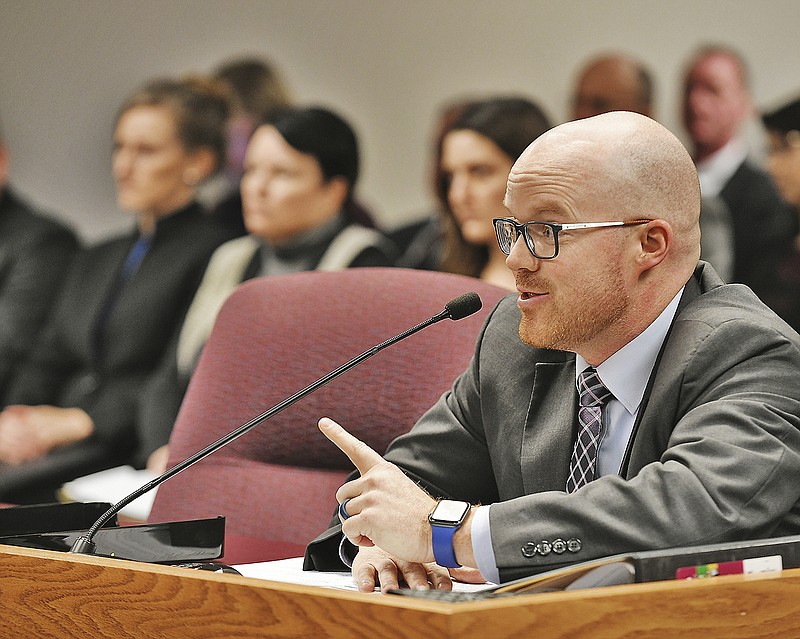Innovative businesses would have the chance to apply for temporary exemptions from certain regulations under a bill perfected Wednesday by the Missouri House.
The Regulatory Sandbox Act would create a Regulatory Relief Office with the Department of Economic Development tasked with identifying state laws and regulations that could be waived for certain businesses for a two-year period. Businesses could apply with the office for a series of exemptions they would like to benefit from, which would be approved or denied by the office.
The office would be advised and could be countered by an advisory committee made up of executive and legislative appointees, lawmakers, and the heads of the Commerce and Insurance and Economic Development departments.
Waived rules would create an open "sandbox" for businesses to operate in without typical regulatory burdens to see how they might fare.
Businesses eligible for the sandbox program would be those that use new or emerging technology or ideas for their products, production or services and have a physical presence in the state.
Sandboxes are becoming more common across the country. Thus far, nearly a dozen states have established sandboxes, mostly for specific industries such as insurance and financial technology.
Kentucky, the only neighboring state to have a program on the books, extends the opportunity to insurance companies alone.
If the bill were to pass with the current proposal intact, Missouri would become the second state to create an all-encompassing sandbox program after Utah, which enacted its own last year.
The bill was before the full body for perfection Wednesday after making it through the committee process earlier this month.
"This is an opportunity for Missouri to be a real leader in this field and say that we like innovative ideas," sponsor Rep. Alex Riley, R-Springfield, told his colleagues. "We want entrepreneurs, innovators, folks that want to better themselves and their communities to come here to establish their services, open up their businesses and provide those benefits to our state economy."
The bill as perfected included new transparency measures, a suggestion Riley said had been raised in committee. The new language would open committee meetings to the public unless private information is being discussed, while another portion would see incident reports, complaints and information on the removal of sandbox participants publicly available.
The bill saw support from Riley's Republican colleagues during its time on the floor.
Rep. Travis Fitzwater, R-Holts Summit, pointed to the regulations waived by the government amid the COVID-19 pandemic.
"We've seen with the pandemic how removing regulations in a space can help create innovative solutions to today's problems, and this is the answer to that on a broader scale for innovative technologies," Fitzwater said. "We need to remove government from some of these things we don't understand so we can test how these entrepreneurs are working in the marketplace."
Opinions on the other side of the aisle were more split.
Several Democratic lawmakers questioned the scope of the bill, as well as the possibility of lopsided consideration of applicants, the addition of further bureaucracy, potentially dangerous waivers and the lack of requirements for bipartisan membership on the committee.
"It is an unequal application of laws for different companies, and I'm just wondering why we bother making regulations and laws if a company can get them waived," said Rep. Sarah Unsicker, D-St. Louis.
Rep. Jerome Barnes, D-Raytown, said, "Kids play in the sandbox, and I think that parents should play by the rules."
Rep. Trish Gunby, D-St. Louis, supported the bill for its potential to attract more prominent business to Missouri. She said more of the tech industry was beginning to take notice of the state, citing Meta's recent decision to construct a massive data center in Kansas City and the St. Louis Cortex Innovation Community, a district devoted to technology and research in St. Louis. Gunby said Missouri had the opportunity to be on the forefront of the innovation industry.
"All these tech companies that are looking for places to expand," she said. "I see it as an opportunity to encourage that growth and development."
Riley's bill requires one more vote to be passed along to the Senate, where a parallel effort passed out of committee last week.
Click the link below in our digital edition to read the full bill:
• HB 2587: The Regulatory Sandbox
Sponsor: Rep. Alex Riley

